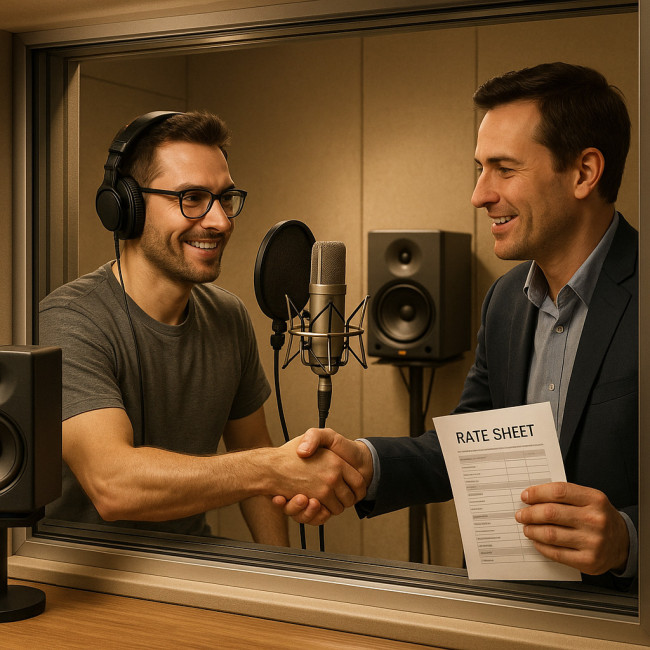Negotiating voice-over rates: a guide for both talent and agency recruiters
Voice-over pricing can feel like a maze. This guide breaks down benchmark numbers, negotiation tactics and contract clauses so both voice talent and agency recruiters can reach fair, lasting deals.
Why voice-over rates vary so much
Two projects that sound alike on paper can command radically different fees. Rates change because of:
- Usage – internal training video vs. national TV spot.
- Audience size & reach – geo-targeted campaigns cost less than global ones.
- Exclusivity – limiting a talent from competing gigs drives prices up.
- Session length and number of revisions – added pick-ups mean extra studio time.
- Union status – SAG-AFTRA or Equity contracts include fixed minimums and residuals.
Baseline rate benchmarks in 2024
| Project type | Typical buy-out (USD) | Usage term |
|---|---|---|
| Internal corporate video (non-broadcast) | $350 – $600 | Perpetual, internal only |
| E-learning (per finished hour) | $200 – $400 | Perpetual, closed platform |
| Explainer / YouTube ad (online paid) | $500 – $1 000 | 12 months, web & social |
| Regional TV commercial | $750 – $1 500 | 13 weeks, one region |
| National TV commercial | $1 500 – $4 000 + residuals | 13 weeks, national |
Visual snapshot of current market medians
Source : GVAA Rate Guide
Calculating a project-specific quote
1. Start with your base session fee
Many talents charge a minimum “first hour” studio rate of $200 – $350. This covers preparation, studio time and basic editing.
2. Layer usage on top
Ask six questions:
- Where will the audio run? Web, TV, OTT, radio, in-store?
- How long will it stay live?
- How big is the audience? Local city, one country, global?
- Is the voice attached to a paid campaign or organic post?
- Will the brand request exclusivity in the talent's category?
- Does the script imply future cut-downs or translations?
3. Factor session overheads
- Remote patch fees (Source-Connect, ISDN).
- Studio rental if the talent doesn't record at home.
- Post-production: de-breath, mastering, synced WAV splits.
4. Convert to a recruiter-friendly quote sheet
Agency producers often approve budgets faster when they see a clear breakdown. Include:
- Session fee
- Usage fee (with territories & dates)
- Options for renewals or extra cut-downs
- Overtime & pick-up rates
Need a template? Our article on respectful recruiter outreach outlines email structures that double response rates.
Negotiation prep for voice talent
Winning rates is easier when you lead the conversation with data and flexibility.
- Know your comparables – check guides, peers and projects listed in industry rate round-ups.
- Offer scaled packages – internal-only, digital-only, broadcast tiers.
- Propose shorter renewals – a 6-month licence lowers the upfront ask.
- Stay ready for live test reads – fast demos often seal premium fees.
Negotiation checklist for agency recruiters
Recruiters juggle deadlines, budgets and client expectations. Use this seven-point list to lock talent quickly without overpaying.
- Confirm usage & territories before any price talk.
- Request session availability upfront. Same-day patch often costs more.
- Ask for optional pacing – slow, neutral and excited reads – to cut retakes.
- Capture pronunciation guides early to avoid costly pick-ups.
- Benchmark against union scales even for non-union hires.
- Budget 10 % wiggle room for unforeseen cut-downs or language versions.
- Secure buy-out wording in writing, especially for digital evergreen content.
Many agencies also check a performer's profile metadata first. See how high-spec demos influence negotiation leverage.
Common sticking points & quick resolutions
- Exclusivity vs. category conflict – limit exclusivity to the product segment, not entire industry.
- Usage renewals – negotiate pre-agreed renewal fees at 110 % of the first term to save admin.
- Global online ads – split the world into tier-one and tier-two regions to match campaign ROI.
- AI voice clones – add “no synthetic use” clauses unless compensated separately.
Contract clauses that protect both sides
A concise contract makes payment and compliance painless:
- Payment terms – 30 days net, late fee 2 % monthly.
- Kill fee – 50 % if project cancels after recording but before launch.
- Credit & confidentiality – specify whether the talent may list the project on their reel.
- Moral rights – bar edits that distort the original performance.
- Compliance with local advertising rules – especially pharma, finance and children's content.
For multi-disciplinary campaigns, recruiters often study collaboration rules similar to those on Artfolio collaborative job boards.
FAQ
- Should I charge per finished minute or per word?
- For e-learning and audiobooks, per finished hour/minute is standard. Commercials rely on session + usage fees.
- Can I reuse a previous session fee for a new cut-down?
- Yes, if it remains inside the original term and platforms. Otherwise price a renewal.
- How do residuals work on TV ads?
- After the initial 13-week cycle, each additional period triggers a new payment—often 75 % – 100 % of the first cycle.
- What if the client wants international exclusivity?
- Increase usage fees significantly or narrow the exclusivity to 12 months with a clear renewal rate.
- Are AI voice clones covered by standard contracts?
- No. Add explicit language forbidding synthetic replication unless a separate licence is negotiated.
Quick self-test: are you negotiation-ready?
Takeaway & next step

Negotiating voice-over rates is less about haggling and more about aligning value with real-world reach. Whether you're a talent fine-tuning your quote or a recruiter juggling multiple bids, bookmark this guide, compare it with other day-rate frameworks and head into your next call confident and prepared.
Need a personalised rate breakdown? Reach out, and we'll craft a usage-specific quote in under 24 hours.











